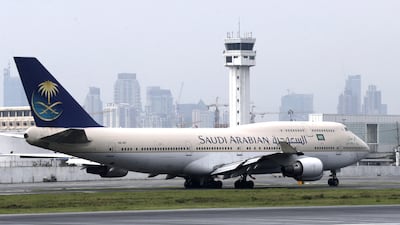Saudi Arabian Airlines, known as Saudia, is considering placing an order for widebody planes next year that will fuel expansion plans with its low-cost unit Flyadeal by 2030, as part of the kingdom’s push to become a global transport hub.
The carrier is in “very advanced talks” with Boeing and Airbus for its plane order, with a decision to be made in early 2022, Ibrahim Koshy, chief executive of Saudia, told The National at the Dubai Airshow on Sunday.
The airline is in the final stages of deciding between aircraft models, with the Airbus A350s and Boeing 787s and 777X under consideration, he said.
The discussions with Airbus and Boeing also includes freighters such as the A350 freighter version and 777X freighter variant, Mr Koshy said.
Saudia aims to grow its fleet to 250 aircraft in the next eight years (excluding Flyadeal), up from about 150 jets currently, he said. It now has in its fleet a mix of Boeing 777s and 787s as well as Airbus A320 family jets and A330s, according to its website.
The airline plans to expand with Flyadeal to about 200 destinations by 2030, up from the 90 routes served in 2019 prior to the pandemic, Mr Koshy said.
Saudia will require widebody aircraft to serve the mainly international new routes it plans to open by 2030, with expected growth in Europe, the Americas and Asia-Pacific, the chief executive said.
Asked about how the airline plans to pay for the potential order, Mr Koshy said commercial banks in Saudi Arabia have been open to aircraft financing deals.
Saudia’s expansion ambitions comes as the kingdom prepares to launch a new state-owned airline based in Riyadh, while Saudia will focus on developing its Jeddah hub.
“Saudi Arabian airlines with the growth that is projected in religious traffic to 35 million passengers annually, plus the expected growth for the western region of Saudi Arabia all the way from Neom, Amaala, the Red Sea development and all the new resorts that are coming, the targeted growth is quite substantial,” Mr Koshy said. “There’s substantial growth targeted for the western region. We would focus on serving that market."
The airline expects to return to profitability by 2023 to 2024, once it achieves pre-Covid levels of passenger traffic growth, he said.
“We’re coming out leaner and stronger and committed to sustainability,” Mr Koshy said. The airline's sustainability goals are in line with the kingdom’s target of reaching net-zero carbon emissions by 2060, he said.
The airline did not seek state aid to help it weather the Covid-19 crisis, according to the chief executive.
“We started with a very strong balance sheet at the beginning of the pandemic and we were able to see ourselves through without going and requesting support that would be a burden on government, without taking anything that was specifically for the airline industry,” he said.
Saudia’s strong domestic market was able to sustain it well during the pandemic and the ensuing restrictions on international travel, he said.














